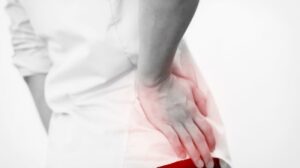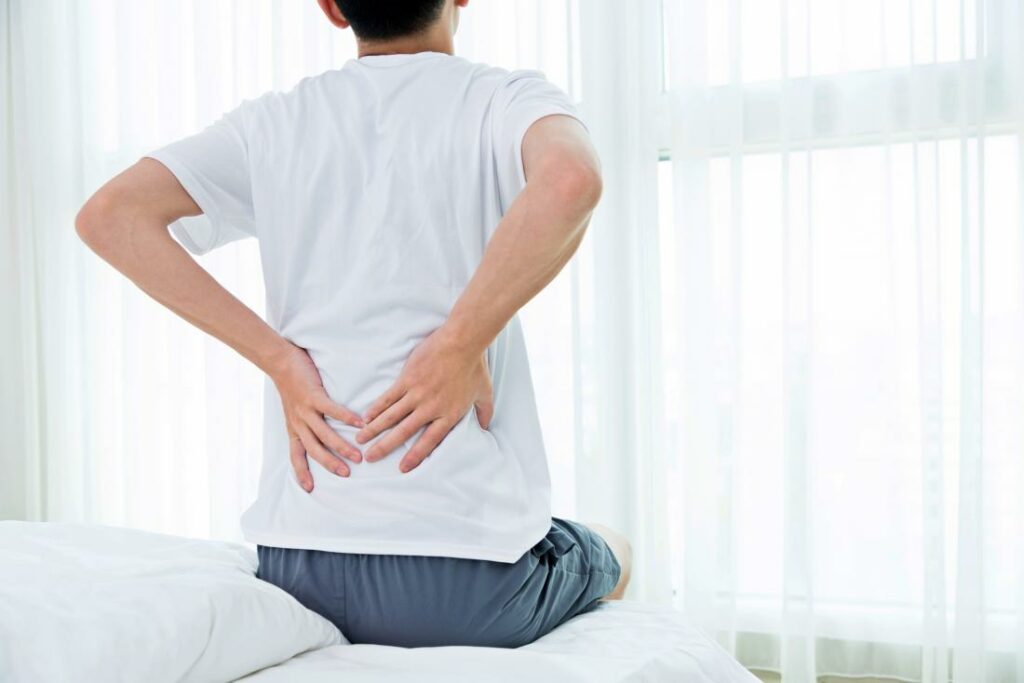Do you wake up in the morning with hip pain? You’re not alone. Many people experience hip pain when they first get out of bed in the morning. In this blog post, we will discuss six possible causes of hip pain when waking up. We will also provide tips on how to alleviate this pain.
Contents
What Is Hip Pain?

Hip pain is any pain or discomfort that occurs in or around the hip joint. It can be sharp, dull, shooting, burning, or aching. The pain may be constant or may come and go. It can be mild or severe. Hip pain can occur suddenly (acute) or gradually (chronic). It can be a short-term (acute) problem, or it can last a long time (chronic).
6 Causes Of Hip Pain When Waking In The Morning

The causes of hip pain when you wake up in the morning. They are as follows:
Arthritis
Arthritis is a common cause of hip pain. There are many different types of arthritis, but osteoarthritis and rheumatoid arthritis are the most common. Rheumatoid arthritis is an autoimmune disorder that causes inflammation of the joints.
Bursitis
Bursitis is the inflammation of a bursa, which is a small sac of fluid that cushions the joint. Bursitis can be caused by overuse, trauma, or infection. For instance, if you sleep on your side, the weight of your body can put pressure on the bursa in your hip, causing it to become inflamed.
Tendinitis is the inflammation of a tendon. The tendons are the cords of tissue that attach muscle to bone.
Hip Fracture
A hip fracture is a break in the upper part of the thighbone (femur). A hip fracture can be caused by a fall or by an injury.For instance , if osteoporosis and a bone in your hip weaken, it may break with a minor fall or even without an injury. A hip fracture usually requires hospitalization and surgery.
Osteoarthritis
Osteoarthritis is the most common form of arthritis. It occurs when the cartilage that cushions the ends of your bones breaks down. This causes the bones to rub against each other, which can be painful. osteoarthritis can affect any joint in your body, but it most commonly affects joints in the hands, knees, hips, or spine.
Labral Tear
A labral tear can cause pain in the hip and groin area. You may also feel a clicking or popping sensation when you move your hip. A labral tear can also make it difficult to move your hip.
The labrum is a ring of cartilage that surrounds the socket of the hip joint. A labral tear is a tear in this cartilage. A labral tear can be caused by injury or overuse. For example, you might tear your labrum if you fall on your hip or if you participate in a sport that involves a lot of hip movements, such as basketball or hockey.
Muscle Strain
Muscle strain is a common cause of hip pain. Muscle strains can be caused by overuse, trauma, or poor conditioning. For instance, if you play a sport that involves a lot of running or jumping, you may be more susceptible to developing muscle strains.
If you are experiencing hip pain, it is important to see a doctor to determine the cause. Treatment will vary depending on the cause of the hip pain.
Tips To Reduce hip pain when waking in the morning
Some of the tips are as follows:
Use a firm mattress
A firmer mattress will provide better support for your hips and help to reduce pain. If you currently have a soft mattress, consider switching to a firmer one. A supportive mattress can also help to reduce hip pain by keeping your hips and spine in alignment. If your mattress is too soft, it may not provide enough support, which can lead to pain.
Place a pillow between your legs
Placing a pillow between your legs when you sleep can help to take pressure off of your hips and reduce pain.For example, if you are a side sleeper, placing a pillow between your knees can help to keep your hips and spine in alignment.
Wear supportive shoes
Wearing supportive shoes can also help to reduce hip pain. If your shoes do not provide enough support, it can put extra strain on your hips and lead to pain. For example, if you wear high heels often, it can contribute to hip pain. High heels change the way your weight is distributed and can put extra pressure on your hips and lower back. Wearing supportive shoes, such as sneakers or flats, can help to reduce this pain.
Sleep on your side
If you typically sleep on your stomach or back, try sleeping on your side with a pillow between your knees. This will help keep your hips in alignment and may help reduce pain. Sleeping on your side can help to relieve hip pain by keeping your hips in alignment.
Get a massage
Getting a massage can also help to relieve hip pain. If you can’t get a professional massage, try using a tennis ball or foam roller to massage the affected area. For example, if you have tightness in your IT band, roll the tennis ball along the length of your thigh. If you have a more general hip issue, try lying on your back and placing the foam roller under your hips, then rolling back and forth.
Try stretching
Stretching can help to loosen up the muscles and connective tissue around the hip joint, which may help to reduce pain. Try doing some gentle stretches before bedtime or first thing in the morning.
Use a heating pad
Applying heat to the area can help to loosen up tight muscles and ease the pain. You could place a heating pad on your hip for 15-20 minutes before getting out of bed in the morning. Applying heat or ice to the affected area can help reduce pain and inflammation.
Consider taking over-the-counter medication
If your hip pain is due to inflammation, you may want to try taking over-the-counter medication. It includes ibuprofen and aspirin. These will help reduce the swelling and pain in your hip. If you can’t tolerate these medications, ask your doctor about other options.
See a doctor
If the pain is severe or does not improve with self-care, it is important to see a doctor to rule out any underlying medical conditions. For instance, morning hip pain could be a sign of arthritis, bursitis, or tendinitis. If you are experiencing hip pain that is accompanied by other symptoms like fever, redness, or swelling, it is important to see a doctor right away as this could be indicative of a more serious condition.
Conclusion
It may be concluded that hip pain when waking in the morning is a common problem with many possible causes. However, most cases of hip pain can be successfully treated with conservative measures such as over-the-counter medication, physical therapy, and weight loss. In some cases, more invasive treatments such as surgery may be necessary. However, hip pain is a treatable condition and there are many options available to those who suffer from it.
If you are experiencing hip pain, be sure to talk to your doctor so that the proper diagnosis and treatment can be administered.
Physical Therapy help patients recover from pain. If you’re experiencing Back pain, Shoulder pain, Knee pain, Neck pain, Elbow pain, Hip pain, or Arthritis pain, a physical therapist at MantraCare can help: Book a physiotherapy session.


